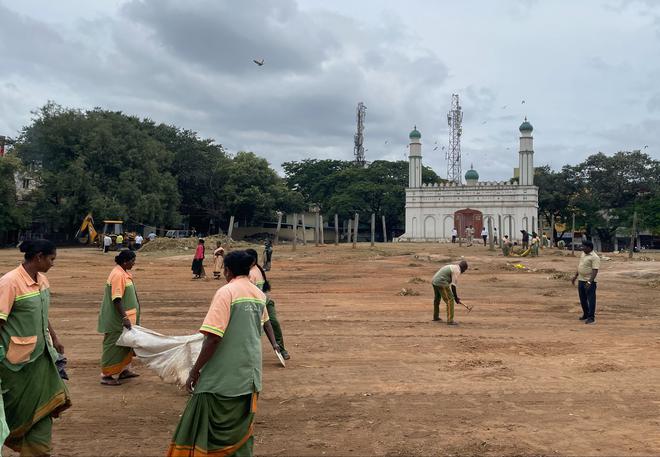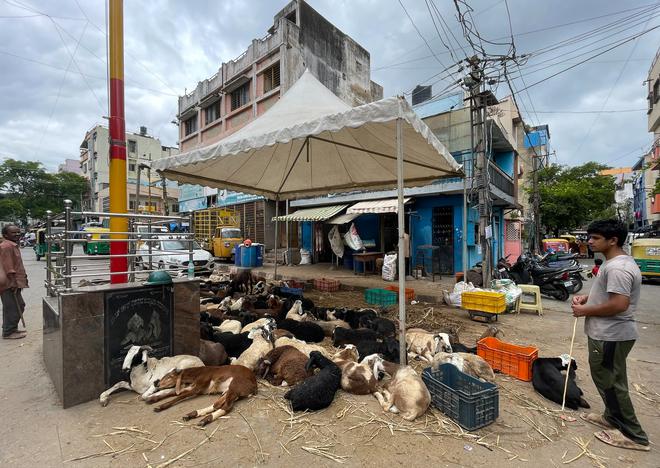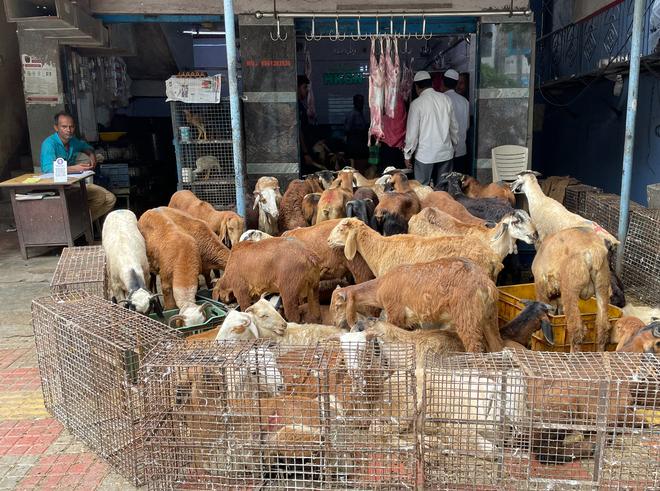With Eid al-Adha, also known as Bakrid, just around the corner, it’s that time of the year again when Bengalureans look forward to eating and sharing delicious biryani. As Muslims in the city gear up to celebrate the much-awaited festival, farmers and shepherds, however, are heading back home, disappointed with the poor demand for sheep.
The Hindu visited a couple of grounds and markets selling sheep and found out that the sales have almost come to an end. The Chamarajpet Idgah maidan that is full of farmers and buyers even on the eve of Bakrid every year, wore a deserted look even as the preparations for the big day had begun.

Speaking to The Hindu, a representative from MLA Zameer Ahmed’s office said, “Every year, we ask the farmers to clear the ground three days before Eid to prepare for the mass namaz at the Idgah. However, if sales are going well, we let them continue until the last day. This year, farmers cleared their spots three days before the festival. Since we have more time now, we have already begun clearing all kinds of waste and debris from the ground.”
Poor sales
Sheep farmers at the Bilal Masjid in BTM, who have come from across the State, also said the sales had seen a dip compared to last year. Rafi, a farmer from Srinivasapura said, “We arrived today (Monday) hoping there would be more sales close to the day of Eid, but there is no sign of any kind of profit this year.”

Another farmer Shankarappa and his wife hailing from Ballari said, “We don’t know what the problem is, but the sales are very low this year. We have come all the way from Ballari, and we sell sheep at the same spot every year. Last year, we sold 150 sheep. Assuming sales would be good this year too, we transported 150 sheep all the way from our hometown by hiring a lorry, but we have not sold more than 75.”
Sales are average in Tilaknagar too, say farmers and butcher shop owners. “Sales are poor this year. Last year was good. We are selling sheep ranging from ₹10,000-15,000, that have been procured from Ballari and Dabaspet,” said Jameel, a butcher shop owner.
Wahid, a teenager who has grown up assisting his father at his butcher shop, said though sales had picked up last year post-COVID, they have gone down again. “Due to the COVID-19 lockdown, sales had dipped. But last year was wonderful and we expected a great turnout this year, too. However, it has been average. Our sheep have been procured all the way from Amingad. Based on the size, we sell sheep ranging from ₹12,000 to ₹20,000, but even the cheapest sheep are not selling well this year.”
Small, limited-period business during Bakrid

While many farmers and butcher shop owners are busy trying to sell sheep, a roadside footwear shop owner sells ornaments, accessories and fodder for the sheep before Bakrid. Farooq, who has been selling footwear on the streets of Tilaknagar for the last 15 years, runs this small business for not more than four days just before Bakrid.
“I have an injured leg and can’t do a job that demands moving around too much, so I have been selling slippers here for the last 15 years. During COVID, I started selling masks too. Every year during Bakrid I also have this small business for a limited period but it does really well,” he said.
Farooq explained that people love decking up the sheep and treating them well before they are sacrificed. “Those who celebrate Bakrid, make sure the sheep is treated like royalty before they are sacrificed. People like decking up the sheep and feeding them healthy food. I have a range of ornaments for sheep, ranging from neck bells, anklets, stomach belts and some that decorate the entire body. People love buying these ornaments,” he said. Farooq also sells a variety of fodder procured from wheat, maize, ragi and lentils, including toor dal, horse gram, green gram, and a few others.







